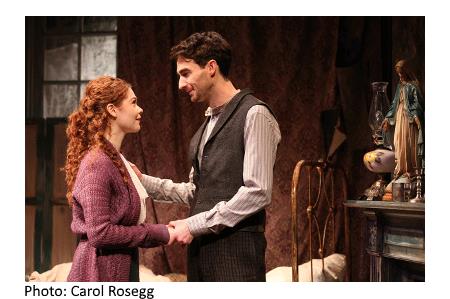


“That’s the Irish people all over. They treat a joke as a serious thing, and a serious thing as a joke.”
The speaker is Seumus Shields (a spirited Michael Mellamphy), a peddler who supports the rebels, but frets the Irish may not be ready for self-government. Still, he is openly terrified of the Black and Tans, the feared British troops who conduct raids in Dublin’s tenements.
Now off-Broadway at the Irish Rep, The Shadow of a Gunman, set in 1920 during the Irish War for Independence, is staged in Seumus’ dingy tenement room. It houses a sagging bed, religious statuary and his roommate, Donal Davoren (James Russell), a poet disgusted by politics, war and mawkish notions of patriotism.
The forlorn poet bangs out his work on a typewriter, a small vase of flowers on the table. It’s his refuge in a sea of uncertainty.
Yet Donal’s vanity will be the play’s — and his fellow boarders — defining moment. He is mistaken for an IRA gunman by another resident, Minnie Powell (a lovely Meg Hennessy). Because he is smitten with her adoration, he doesn’t deny (false) revolutionary fervor.
The mistake is due, in part, to Seumus’ friend, a Mr. Maguire (Rory Duffy), who leaves a suspicious suitcase.
“No man, Minnie, willingly dies for anything,” Donal tells her. Yet politics is messy and collateral damage is everywhere. Death lives in the shadow of gunmen.
The 1923 play is the first in Sean O’Casey’s Dublin Trilogy, which was followed by Juno and the Paycock and The Plough and The Stars. The Irish Rep will stage both this spring.
As its opening volley, Shadow of a Gunman, though the least produced of the three, is compelling. The naturalistic set by Charlie Corcoran, including laundry hung across the theater, is perfect. So are Linda Fisher and David Toser’s costumes and Ryan Rumery and M. Florian Staab's frightening sound design.
The cast is ideal. John Keating and Terry Donnelly, as Mr. and Mrs. Grigson, expose the gender gap in suffering: He drinks, she worries. James Russell’s Donal is neatly portrayed as a man torn between his lofty poetic isolation and the morality of truth vs. self-preservation.
Director Ciaran O’Reilly has created a masterful production. A blend of the tragic and comedic, O’Casey’s debut work raises provocative questions about the nature of rebellion and the impact endured by ordinary people.
On the contemporary political front, Colin Quinn prides himself on being an equal-opportunity destroyer. His gift for pricking the pretensions of a hyper-partisan nation is solely needed.
In his latest show at the Minetta Lane Theatre, Colin Quinn: Red State Blue State, the veteran comic slams the posturing, contradictions and absurdities that define us as a fractured political entity.
Social media, sex, guns, the breakdown of sanity — it’s all fodder for his legitimate gripes about a country in crisis. He damns the left for being too reaction-oriented and the right for pretending it’s still the Fifties.
And he rightly notes the size of the U.S. makes a unified country a challenge. He even has a solution to our partisan woes.
There is a 700-mile difference between Scotland and Hungary, he observes. Different languages, cultures, religions proliferate. Why, he wonders, did America think it could bridge a 3,000-mile expanse? Now, we are verging on civil war. "It'll be the first time in history you're gonna see fat refugees."
Quinn, whose New York Story hilariously zinged all cultures that came here, is less confrontational in Red State, Blue State. The Brooklyn monologist is adept at finding hypocrisies and vulnerabilities and isn’t afraid to speak his truth — often hitting the bulls-eye on the crazier elements of liberals and conservatives.
Social media, the Founders, the Constitution, sex — nothing escapes his sharp notice.
Yet, while a Quinn show is always good news, he’s pulling his punches here. It’s not a straightforward narrative, and despite some nifty one-liners, more of a comedic retread than revelation. — Fern Siegel